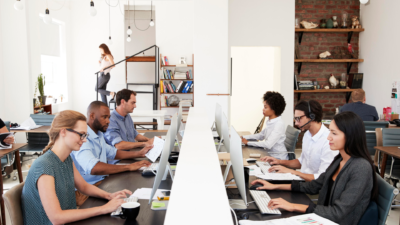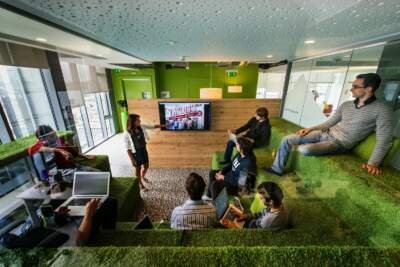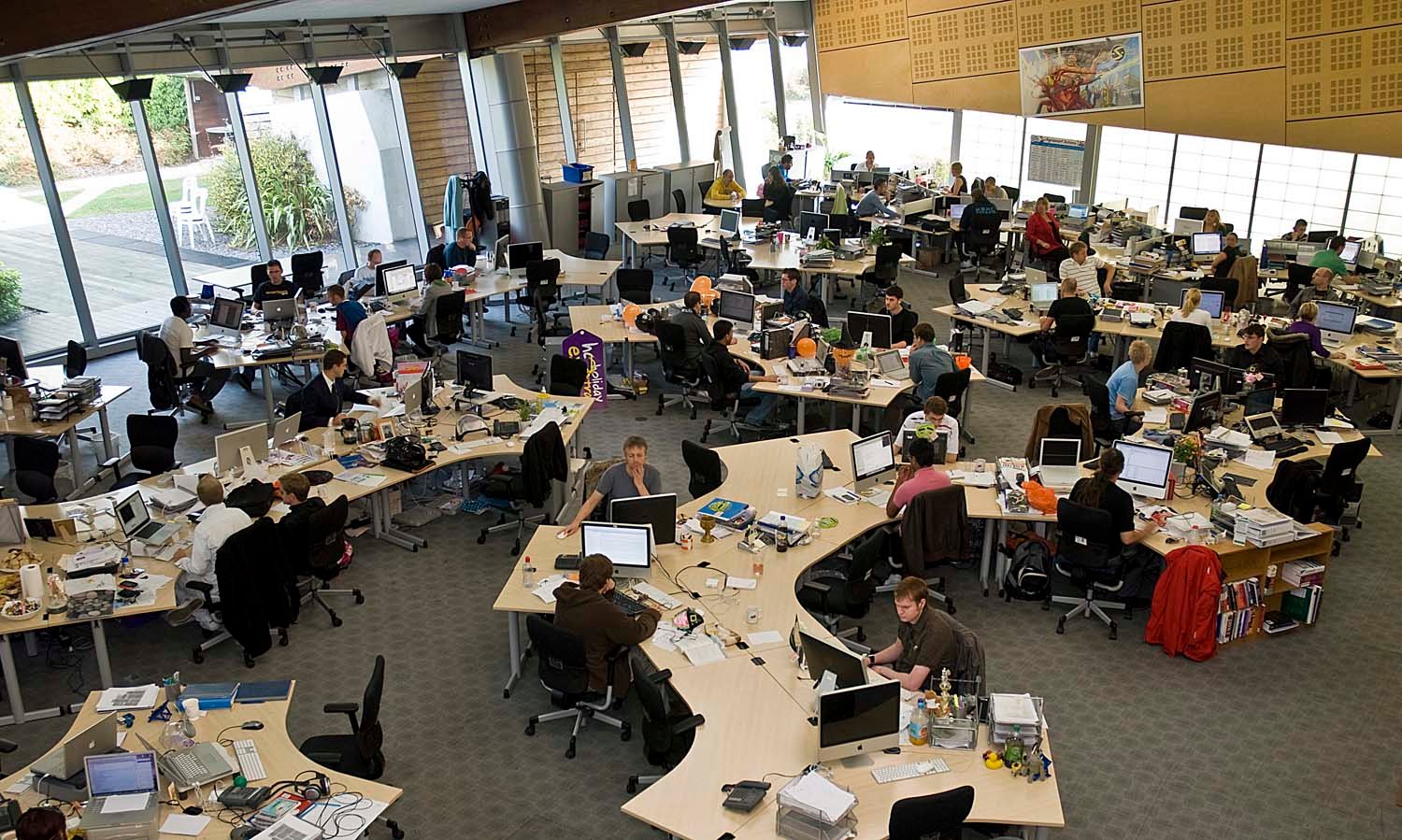Open-Plan Offices
Navigating the Modern Workplace: Open Offices, Cubicles, or Private Offices?
In the ever-evolving landscape of office design, the choice between open-plan offices, cubicles, and private offices has become a pivotal decision. As companies strive to create a conducive work environment, the need to strike a balance between collaboration and individual space is more critical than ever. BUILD A BETTER TOMORROW
Evolution of Office Design:
The history of office design is a journey from traditional open spaces with rows of desks to dedicated spaces for knowledge work and the iconic fabric-clad cubicles of the 1980s. This evolution mirrors the changing dynamics of work and the constant adaptation to new technologies and lifestyles. Open-Plan Offices
Adapting to the Modern Era:
In the present day, as technology advances and concerns for employee well-being take center stage, the design of office spaces is once again undergoing a transformation. The focus has shifted towards creating environments that foster creativity, collaboration, and overall mental health.
Choosing Between Open-Plan, Cubicles, or Private Offices:
The age-old debate persists – which office layout is truly superior? Open-plan offices, with their emphasis on collaboration, have proven to enhance employee engagement and productivity. However, the need for privacy cannot be overlooked, as it contributes to increased productivity and a sense of belonging. Open-Plan Offices
A Hybrid Solution:
Perhaps the answer lies in a hybrid approach – a fusion of open offices and cubicles. By integrating smart, functional, and aesthetically pleasing interior designs, companies can offer dedicated spaces for both collaboration and individual work. This allows employees with diverse work styles and personalities to thrive in a comfortable environment.
Enhancing Privacy for Productivity:
Acknowledging the importance of privacy, the incorporation of features such as lockers for document storage or personal items can significantly improve the employee experience. Striking the right balance ensures that employees feel connected and valued while maintaining the focus needed for individual tasks.
In the dynamic realm of office design, the choice between open offices, cubicles, or private offices is not one-size-fits-all. A thoughtful approach that considers the unique needs of the workforce and combines elements of different layouts can lead to a harmonious and productive work environment. As we navigate the modern workplace, the key lies in adaptability and a continuous commitment to enhancing the employee experience.
The Rise of Remote Work:
With the advent of technology and changing attitudes towards work, remote work has become more prevalent. This shift has influenced office design, as companies now consider creating spaces that cater to both in-office collaboration and the needs of remote workers. Open-Plan Offices

Technological Integration:
The integration of technology in modern office spaces goes beyond traditional workstations. Smart office solutions, such as IoT devices and collaborative tools, play a significant role in shaping the functionality and efficiency of different office layouts. BUILD A BETTER TOMORROW
Employee Well-Being and Health:
The emphasis on employee well-being has led to the incorporation of health-centric designs. This includes ergonomic furniture, natural lighting, and green spaces, fostering a healthier and more enjoyable work environment.
Flexible Workspaces:
Recognizing the need for flexibility, many organizations are adopting flexible workspace designs. These layouts allow for easy reconfiguration, accommodating changes in team structures, project needs, and promoting adaptability in the face of evolving business dynamics.
Environmental Sustainability: Open-plan Offices
As environmental consciousness grows, sustainable office designs are gaining traction. Companies are incorporating eco-friendly materials and energy-efficient systems to create workspaces that align with broader corporate social responsibility goals.
Employee Feedback and Inclusivity:
Gathering feedback from employees plays a crucial role in shaping office designs. Inclusive spaces that consider diverse needs and preferences contribute to a positive and collaborative work culture.
The Role of Leadership in Office Design:
Leadership plays a pivotal role in influencing office design decisions. Engaging leaders who understand the importance of a well-designed workspace can lead to environments that foster innovation, productivity, and employee satisfaction. Open-Plan Offices
Measuring the Impact:
Evaluating the success of different office layouts involves metrics such as employee satisfaction, productivity levels, and collaboration rates. This data-driven approach helps organizations refine their designs based on real-world performance. BUILD A BETTER TOMORROW
Including these additional points provides a comprehensive view of the evolving landscape of office design, covering not only the physical layout but also the broader aspects influencing the modern workplace.

Cultural Considerations:
Cultural aspects influence office design choices. Companies are now recognizing the importance of aligning the physical workspace with organizational culture. A space that reflects the company’s values and encourages a positive cultural environment can enhance employee engagement and satisfaction.
Security and Privacy Concerns:
With the increasing reliance on digital platforms, ensuring data security and respecting privacy have become paramount. Office designs need to incorporate measures to provide secure work environments, both physically and in the digital realm.
Collaboration Zones and Huddle Spaces:
Beyond traditional meeting rooms, the inclusion of collaboration zones and huddle spaces has become popular. These informal settings allow for spontaneous discussions, fostering creativity and teamwork outside of formal meeting structures.
Learning and Development Spaces:
Continuous learning is integral to professional growth. Modern office designs are incorporating dedicated spaces for training sessions, workshops, and knowledge-sharing activities, supporting employees in their ongoing development. BUILD A BETTER TOMORROW
Art and Aesthetics:
The aesthetics of the workplace contribute to the overall mood and atmosphere. Integrating art and thoughtful design elements can create an inspiring environment that boosts creativity and employee morale.
Agile Office Management: Open-plan Offices
The concept of agile office management extends beyond physical layout. It involves flexible policies, allowing employees to choose when and where they work, promoting autonomy and trust within the organization. BUILD A BETTER TOMORROW
Resilience and Future-Proofing:
As businesses face uncertainties, designing resilient and adaptable workspaces has become crucial. Future-proofing office layouts involves considering potential changes in technology, work trends, and business strategies.
Community Engagement and Corporate Social Responsibility:
Connecting with the local community and contributing to social causes is increasingly important for companies. Office designs that encourage community engagement and reflect corporate social responsibility initiatives can enhance the company’s reputation and employee pride.
Wellness Programs and Facilities:
Companies are going beyond ergonomic furniture and incorporating wellness programs and facilities within the workspace. This may include on-site fitness centers, meditation rooms, and wellness initiatives that support employees’ physical and mental health.
By exploring these additional facets, the article can offer a more in-depth understanding of the multifaceted considerations shaping modern office design. It reflects a holistic approach that goes beyond the physical layout to encompass the diverse elements influencing the work environment.

What sets Saudi Design Group apart?
Office Noise Reduction: Strategies for a Quieter Workspace

